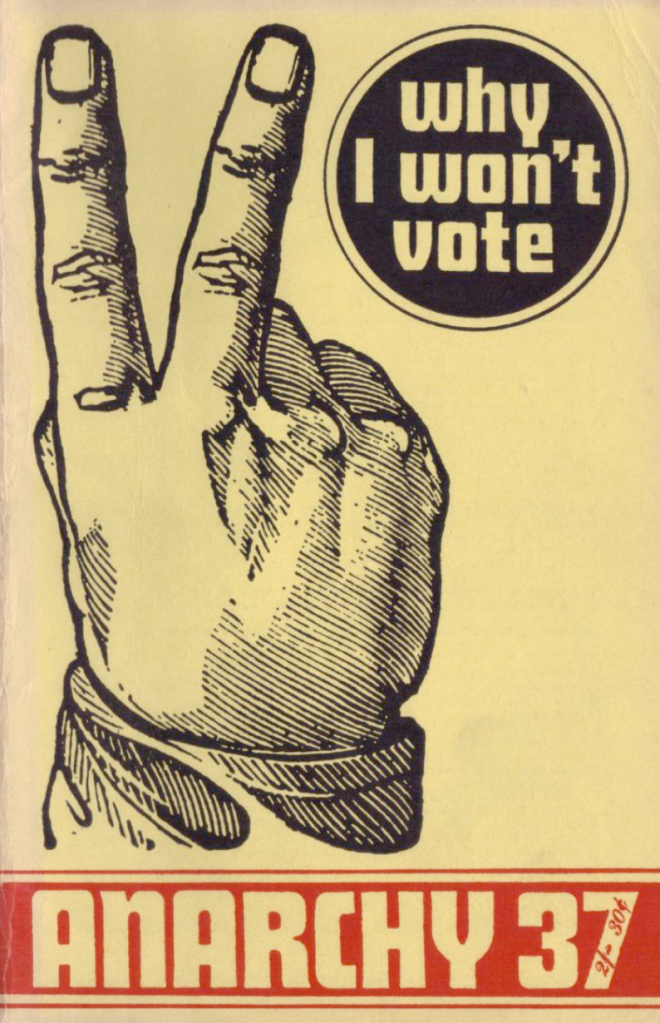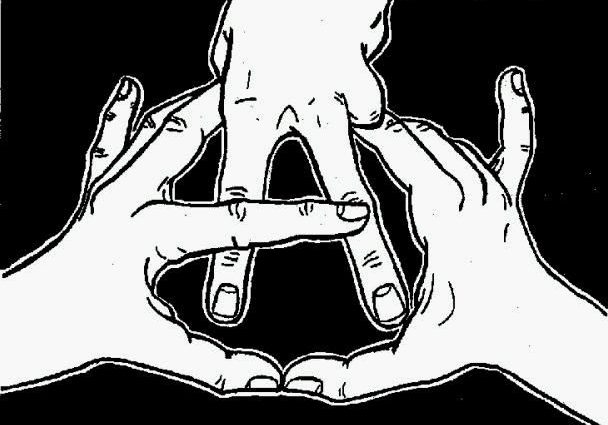
Anarchy 37, March 1964,
Why I Won’t Vote
RITA MILTON
The exasperated parting shot of one frustrated canvasser, who came knocking at our door, that we should be forced, albeit democratically, to vote for one party or another, is typical of the confused elector. Befuddled by the great political hoax he believes that the ballot box confers upon him a say in government policies and decisions. It is argued that those who actively oppose the democratic system of “choice” are failing in their duty, and therefore do not deserve the services provided by a benevolent state.
It does not seem to have occurred to our blinkered citizen that if his party fails to get power it makes nonsense of the system of choice. He may support a party on the basis of its nationalisation programme, with no choice but to accept a party dedicated, for instance, to free enterprise. The fact that millions of people may be yearning for a ruling party of one political colour, but are prepared to accept one of a slightly different shade, means that a government can legislate on important issues even with a minority vote. It would seem that the majority of people feel it essential that they should be governed.
As for the over-rated social services, these are paid for out of taxation and the essential work is carried on, not by government officials, but by nurses, doctors and dustmen. But whatever government is holding power, it will never consult the voters before waging war; or ask how much of the ” national income ” should be spent on armaments, or even give a choice in the selection of enemies! Is their opinion sought in the shaping of laws and punishments ? Do economic priorities express the general will on the pittance paid to old age pensioners and the unemployed ?
Whoever heard of a government enquiring as to the relative importance, from any point of view, of research into welfare, disease and food production, as against research into defence problems (war), space probes and motor car production ? These are only a few of the issue which affects the lives of everyone in varying degrees, and on which governments make decisions without consulting the people who keep them in power.
The majority of people seem to hold a contradictory set of beliefs about the nature of government and their own role in relation to it. They argue that government is necessary even when they disagree with many of its policies, but say, ” there is not much we can do about it”. At the same time they vote in their millions, convinced of their own importance in the shaping of national decisions. They are in fact only important as numbers, the sum of which will decide which set of rulers will govern in any way their please. The ballot box is a gigantic prop for the collective ego.
But this is not a plea for a greater measure of say in government policies. If the people expressed their real power it is doubtful if they would act differently in any significant way and there would be no substantial change.
I will not vote because I do not want to be governed; because no government can create the kind of society I want — without national boundaries, war or hunger, prisons or privilege — therefore to me, voting would be pointless and hypocritical.
I can exercise my responsibility in a positive way be refusing to take part in war or preparations for war, by refusing to be used by any government for ends which have nothing to do with the needs of mankind. I do not have to vote in order to support the positive social trends on which a free society may really be built.
If I were committed to a political party, my loyalties would be limited to that party’s aims, and my right as a free agent would be thrown into the voting pot. From this position it is a small step to the concept ” my country right or wrong “, inherent in the whole system of government, which by its very nature creates the divisions which set one against the other.
